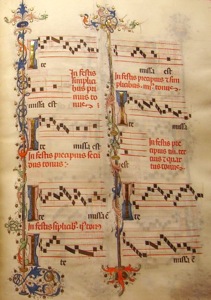Difference between revisions of "Hymn"
m (Text replacement - "http://nordan.daynal.org" to "https://nordan.daynal.org") |
m (Text replacement - "http://" to "https://") |
||
| Line 3: | Line 3: | ||
==Origin== | ==Origin== | ||
[https://nordan.daynal.org/wiki/index.php?title=English#ca._1100-1500_.09THE_MIDDLE_ENGLISH_PERIOD Middle English] ymne, from [https://nordan.daynal.org/wiki/index.php?title=English#ca._600-1100.09THE_OLD_ENGLISH.2C_OR_ANGLO-SAXON_PERIOD Old English] ymen, from [[Latin]] hymnus [[song]] of [[praise]], from [[Greek]] hymnos | [https://nordan.daynal.org/wiki/index.php?title=English#ca._1100-1500_.09THE_MIDDLE_ENGLISH_PERIOD Middle English] ymne, from [https://nordan.daynal.org/wiki/index.php?title=English#ca._600-1100.09THE_OLD_ENGLISH.2C_OR_ANGLO-SAXON_PERIOD Old English] ymen, from [[Latin]] hymnus [[song]] of [[praise]], from [[Greek]] hymnos | ||
| − | *[ | + | *[https://en.wikipedia.org/wiki/12th_century before 12th Century] |
==Definitions== | ==Definitions== | ||
*1a : a [[song]] of [[praise]] to [[God]] | *1a : a [[song]] of [[praise]] to [[God]] | ||
| Line 12: | Line 12: | ||
A '''hymn''' is a [[type]] of [[song]], usually religious, specifically written for the [[purpose]] of [[praise]], [[adoration]] or [[prayer]], and typically addressed to a [[deity]] or deities, or to a prominent figure or [[personification]]. The word hymn derives from [[Greek]] ὕμνος (hymnos), which means "a song of [[praise]]." Collections of hymns are known as hymnals or hymnbooks. | A '''hymn''' is a [[type]] of [[song]], usually religious, specifically written for the [[purpose]] of [[praise]], [[adoration]] or [[prayer]], and typically addressed to a [[deity]] or deities, or to a prominent figure or [[personification]]. The word hymn derives from [[Greek]] ὕμνος (hymnos), which means "a song of [[praise]]." Collections of hymns are known as hymnals or hymnbooks. | ||
==Origins== | ==Origins== | ||
| − | Ancient hymns include the Egyptian [ | + | Ancient hymns include the Egyptian [https://en.wikipedia.org/wiki/Great_Hymn_to_the_Aten Great Hymn to the Aten], composed by Pharaoh [https://nordan.daynal.org/wiki/index.php?title=Paper_95#95:5._THE_REMARKABLE_IKHNATON Akhenaten]; the [https://en.wikipedia.org/wiki/Vedas Vedas], a collection of hymns in the [[tradition]] of [https://en.wikipedia.org/wiki/Hinduism Hinduism]; and [https://en.wikipedia.org/wiki/Psalms the Psalms], a collection of [[songs]] from [[Judaism]]. The Western [[tradition]] of hymnody begins with the [https://en.wikipedia.org/wiki/Homeric_Hymns Homeric Hymns], a collection of ancient Greek hymns, the oldest of which were written in the 7th century BC, praising deities of the ancient Greek religions. Surviving from the 3rd century BC is a collection of six literary hymns (Ὕμνοι) by the Alexandrian poet [https://en.wikipedia.org/wiki/Callimachus Callimachus]. |
| − | [ | + | [https://en.wikipedia.org/wiki/Church_Fathers Patristic] writers began applying the term ὕμνος, or hymnus in [[Latin]], to Christian songs of praise, and frequently used the word as a synonym for "psalm". |
==Hymn meters== | ==Hymn meters== | ||
| − | The [ | + | The [https://en.wikipedia.org/wiki/Meter_(hymn) meter] indicates the number of syllables for the lines in each [https://en.wikipedia.org/wiki/Stanza stanza] of a hymn. This provides a means of marrying the hymn's [[text]] with an appropriate hymn tune for singing. In [[practice]] many hymns [[conform]] to one of a relatively small number of meters (syllable count and stress patterns). Care must be taken, however, to ensure that not only the meter of [[words]] and tune match, but also the stresses on the [[words]] in each line. Technically speaking an [https://en.wikipedia.org/wiki/Iambic iambic] tune, for instance, cannot be used with words of, say, [https://en.wikipedia.org/wiki/Trochaic trochaic] meter.[https://en.wikipedia.org/wiki/Hymn] |
[[Category: Music]] | [[Category: Music]] | ||
Latest revision as of 23:56, 12 December 2020
Origin
Middle English ymne, from Old English ymen, from Latin hymnus song of praise, from Greek hymnos
Definitions
- b : a metrical composition adapted for singing in a religious service
- 2: a song of praise or joy
- 3: something resembling a hymn : paean
Description
A hymn is a type of song, usually religious, specifically written for the purpose of praise, adoration or prayer, and typically addressed to a deity or deities, or to a prominent figure or personification. The word hymn derives from Greek ὕμνος (hymnos), which means "a song of praise." Collections of hymns are known as hymnals or hymnbooks.
Origins
Ancient hymns include the Egyptian Great Hymn to the Aten, composed by Pharaoh Akhenaten; the Vedas, a collection of hymns in the tradition of Hinduism; and the Psalms, a collection of songs from Judaism. The Western tradition of hymnody begins with the Homeric Hymns, a collection of ancient Greek hymns, the oldest of which were written in the 7th century BC, praising deities of the ancient Greek religions. Surviving from the 3rd century BC is a collection of six literary hymns (Ὕμνοι) by the Alexandrian poet Callimachus.
Patristic writers began applying the term ὕμνος, or hymnus in Latin, to Christian songs of praise, and frequently used the word as a synonym for "psalm".
Hymn meters
The meter indicates the number of syllables for the lines in each stanza of a hymn. This provides a means of marrying the hymn's text with an appropriate hymn tune for singing. In practice many hymns conform to one of a relatively small number of meters (syllable count and stress patterns). Care must be taken, however, to ensure that not only the meter of words and tune match, but also the stresses on the words in each line. Technically speaking an iambic tune, for instance, cannot be used with words of, say, trochaic meter.[1]
